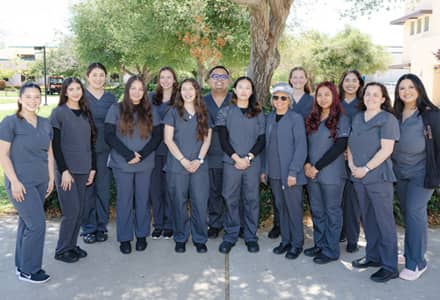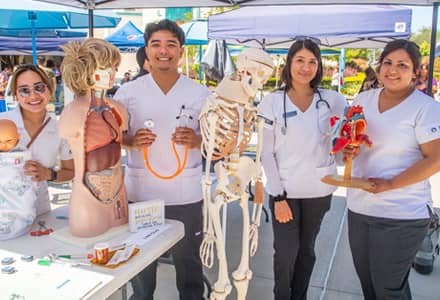Start your nursing career
The nursing programs at Allan Hancock College have been built upon the “ladder concept,” providing the opportunity for upward mobility while continuing to work in a fulfilling career. After any step, you may continue or stop, go to work, and return for more education later. Once accepted into the program, a physical exam, immunizations, and CPR will be required. In addition, the clinical agencies require a background check and drug screening. The acceptance packet will explain more in detail.
The Registered Nursing program is fully accredited by the California Board of Registered Nursing. It is a two-semester program offered every year starting spring semester. Graduates from accredited vocational nursing programs are eligible to apply. The LVN-RN program is specifically designed to provide the LVN with an opportunity for career advancement and prepare the LVN for the additional responsibilities required of the registered nurse.
This program will help you to:
- Evaluate nursing care provided to patients, families, groups, populations, and communities across the lifespan from diverse backgrounds in a variety of settings
- Collaborate with members of the inter-professional health care team to manage and coordinate the provision of safe, quality care
- Use evidence-based quality improvement processes to effect change in the delivery of patient-centered care
- Demonstrate effective use of strategies to mitigate errors and reduce the risk of harm to patients, self, and others
Nursing Priority Registration:
Nursing priority is for students working toward an LVN or RN degree at Allan Hancock College.
- Who is eligible?
- AHC nursing students who have not completed the science prerequisites to apply to the program.
- When does it start, and when do I need to have the form turned in?
- Click on the link and choose the 'When is my Priority Registration date?' - https://www.hancockcollege.edu/admissions/priority.php
- What is the process for getting Nursing Priority?
- Step 1 - Download and read the entire form
- If you meet the requirements, fill out the form.
- Step 2 - Have an updated CSEP completed with a counselor.
- Step 3 - Turn in the completed application with your updated CSEP to the Health Sciences Program Office (Building W, Rm 11)
- Step 1 - Download and read the entire form
Nursing Priority Registration Form
LVN and RN Applicant Changes
This update introduces significant changes to the math prerequisite and general education requirements for LVN and RN applicants. Here's a breakdown:
Math Prerequisite Changes (Effective April 1, 2026 application period):
- Old Requirement: MATH 331 (Intermediate Algebra) or equivalent was acceptable.
- New Requirement: Any transfer-level math 100 course will satisfy the math prerequisite.
- Recommendation for RN to BSN Pathway: MATH 123 (Statistics) is highly recommended and required for a Bachelor's Degree.
- Acceptable Courses: Any course meeting the CSU General Education Area B4 requirement.
AHC General Education Pattern (Effective 2024-2025 Catalog):
- A new general education pattern applies to all associate degrees, including nursing.
- Exemptions:
-
- Students starting the LVN or RN program in Spring 2025.
- Students who have been on the LVN or RN waitlist prior to Spring 2025.
- Licensed LVN students applying to the RN program in July 2025.
Action Items:
- Non-Exempt Students: Required to follow the 2024-2025 AHC general education pattern.
- Counseling Appointments: Recommended for clarification and guidance on completing requirements.
These updates may impact your planning, so consider consulting with a counselor for personalized advice.
The Nursing program is separated into three areas of education:
CNA
-
ENGL C1000 - Academic Reading and Writing (previously ENG 101 - Freshman Composition)
Completion with a grade of "C" or better, or currently taking at the time of application.
LVN
- CNA or Psych Tech license
- ENGL C1000 - Academic Reading and Writing (previously ENG 101 - Freshman Composition)
- Any Math 100 level (statistics is highly recommended)
- PSYC C1000 - Introduction to Psychology (previously PSY 101 - General Psychology)
- Bio 124 (Anatomy)
- Bio 125 (Physiology)
Completion with a grade of "C" or better before you are eligible to apply
RN
- California LVN license (current and unencumbered)
- ENGL C1000 - Academic Reading and Writing (previously ENG 101 - Freshman Composition)
- Any Math 100 level (statistics is highly recommended)
- PSYC C1000 - Introduction to Psychology (previously PSY 101 - General Psychology)
- Bio 124 (Anatomy)
- Bio 125 (Physiology)
- Bio 128 (Microbiology)
Completion with a grade of "C" or better before you are eligible to apply
These requirements will be needed after you have been accepted into the program.
Students must be age 18 (required by California Codes - Business and Professions Code Section 2069-2071)
Complete Background Check (required by clinical agencies for placement). No pending cases may start or continue in the program.
Negative Drug Screening (required by clinical agencies for placement) - if you fail your drug screening, you may not retake it for 1 year.
Current CPR (Healthcare Provider, Professional Rescuer, or BLS ONLY)
Complete Health Physical (required by clinical agencies for placement) - The physical form is included in the acceptance packet.
Immunization Records, which include the following immunizations, positive titers, and/or boosters
Diphtheria, Pertussis, and Tetanus Toxoid (DPT)
Measles, Mumps, and Rubella (MMR)
Varicella (Chicken Pox)
Hepatitis B Vaccination Series
A tuberculin skin test is required before entering the program. Positive PPD requires a standard negative chest x-ray with medical consultation. A standard chest X-ray is required if there is any history of a positive test. Quantiferon Gold test is accepted.
Flu Vaccine - Seasonal (Sept-February)
Contact
Health Sciences Program Specialist, Building W (RM W11)
1-805-922-6966 ext. 3384
healthsciences@hancockcollege.edu
Hours
Office Hours:
Monday-Thursday, 8 a.m. to 4:30 p.m.
Friday, 8 a.m. to 4 p.m.
Program Requirements and Course Sequences
Degrees and Certificates Offered
Each program has unique requirements. The order in which you take courses may affect your completion time. Visit the links below to view the program requirements and a general semester-by-semester course schedule.
Associate in Science- Nursing: Registered Nursing (LVN to RN)
Associate in Science- Nursing: Licensed Vocational Nursing
Certificate of Achievement- Nursing: Licensed Vocational Nursing
Certificate of Achievement- Nursing: 30 Unit Option
Certificate of Accomplishment- Nursing: Certified Home Health Aide
Certificate of Accomplishment- Nursing: Certified Nursing Assistant (CNA)
Certificate of Accomplishment- Nursing: EKG/Monitor Observer
Certificate of Accomplishment- Nursing: Restorative Aide
To view all available degrees and certificates visit the Allan Hancock College course catalog.
Programs you may also be interested in exploring...
Contact Information
Dean: Thomas Lamica
Department Chair: Lauro Manalo
Department Program Specialist: Tawnya Karstrom
LOCATION
Santa Maria Campus, W building, RM 11
Telephone extension: 3384





